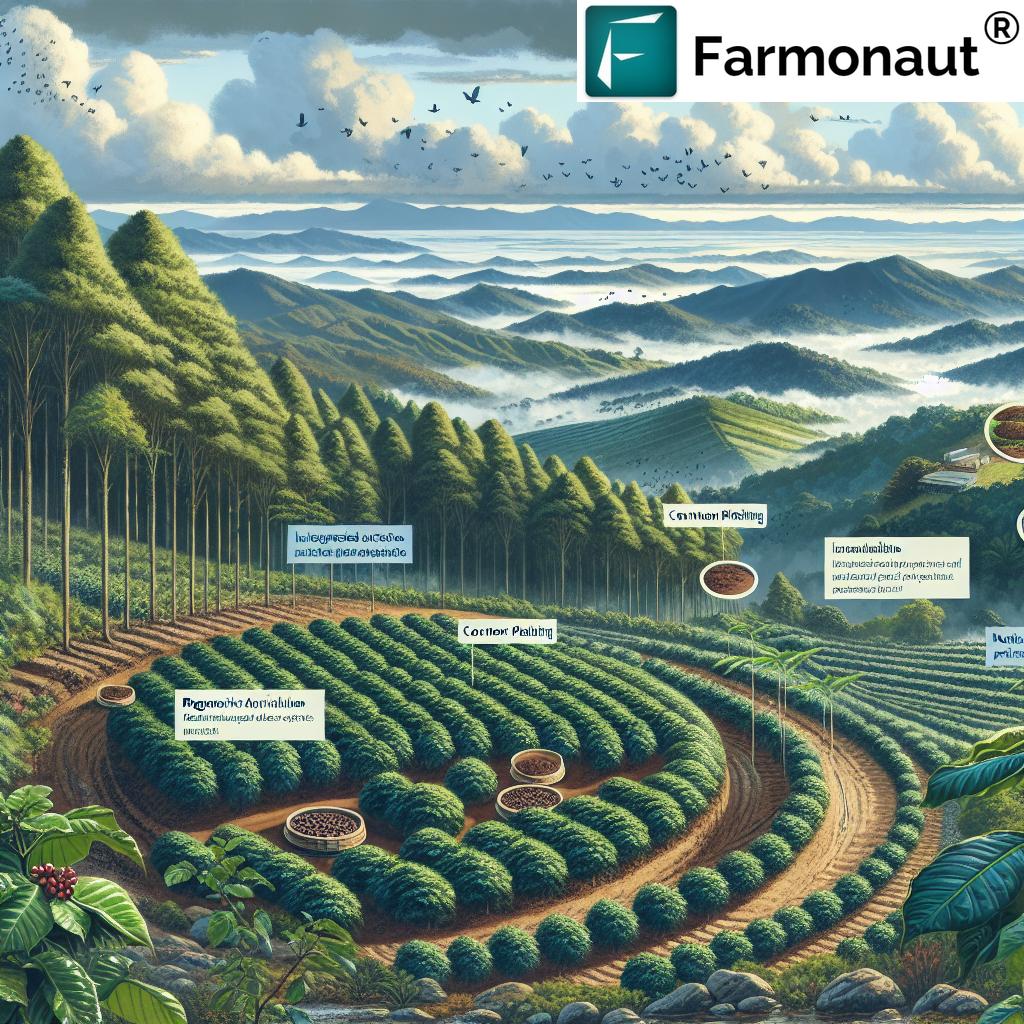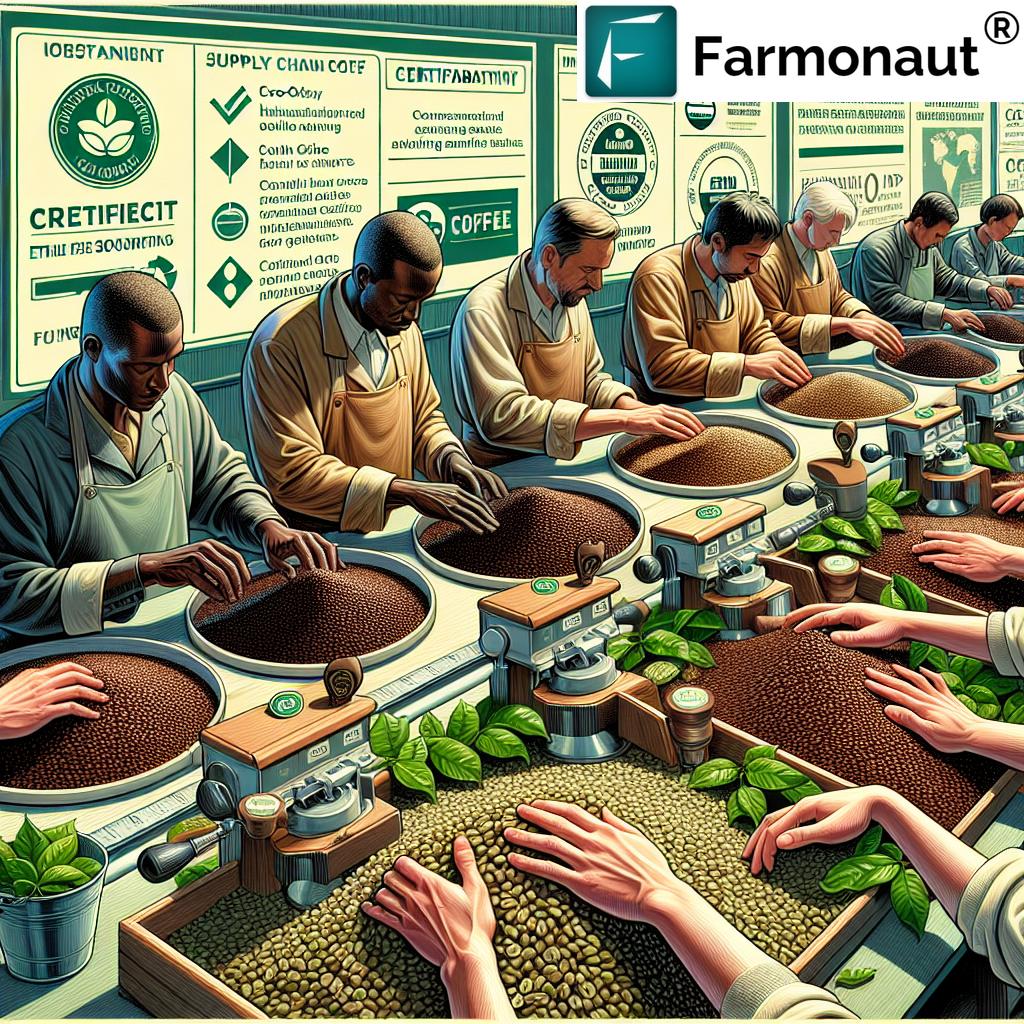Compliance in Coffee: 7 Key Steps for Sustainability
“Over 50% of the world’s coffee is produced by farms participating in sustainability certification programs.”
Introduction
Coffee is one of the most beloved beverages worldwide. Yet, with an ever-increasing global demand, the responsibility for sustainable coffee production has never been more significant. Compliance in coffee extends beyond productivity—it covers a wide range of practices, certification programs, and regulations aimed at guaranteeing sustainable agriculture, environmental stewardship, social responsibility, and economic viability for farmers. Understanding and implementing the key steps to achieve compliance is essential for producers, conscious consumers, governments, and the environment.
In this comprehensive guide, we explore sustainable coffee farming practices, mandatory coffee farming regulations, leading certification programs, technological innovations, and practical solutions to address ongoing challenges in the coffee industry. By following these seven key steps, producers and businesses can ensure their coffee journeys from bean to cup are ethical, resilient, and compliant with global standards.
Dive in as we unearth how sustainability and compliance are shaping the future of coffee worldwide.
Sustainable Coffee Farming Practices
At the heart of coffee compliance lies a commitment to sustainable farming practices. Sustainability in coffee is anchored on protecting the environment, supporting the economic viability of farmers, and safeguarding biodiversity for future generations. Below, we explore crucial methods that exemplify environmental stewardship in coffee production.
Shade-Grown Coffee: Cultivating Under the Canopy
Shade-grown coffee is a leading sustainable coffee farming practice that involves cultivating coffee plants under a canopy of native trees. This approach provides multiple benefits:
- Biodiversity Conservation in Coffee Industry: Forest canopy provides a habitat for migratory birds, insects, and other wildlife, which helps maintain a balanced ecosystem.
- Soil Protection & Reduced Erosion: Roots from overhead trees help anchor the soil, reducing erosion caused by rainfall.
- Complex Flavor Profiles: Coffee beans ripen more slowly under shade, resulting in richer, more complex flavor profiles that attract premium markets.
- Climate Resilience: The microclimate created under the canopy helps mitigate the impact of drought and climate change.
Shade-grown methods are widely recognized by certification programs that require or encourage biodiversity-friendly farming.
Regenerative Agriculture in Coffee Farming
Driven by the urgent need to conserve resources and boost productivity, regenerative agriculture encompasses a variety of techniques:
- Reduced Chemical Use: Minimizing reliance on synthetic pesticides and fertilizers helps protect soil health, ecosystem balance, and water quality.
- Integrated Pest Management (IPM): Combining biological, cultural, and mechanical pest control strategies reduces chemical residue, enhances yield, and is a core part of international standards.
- Planting Native Trees and Crops: Diversifying crops and planting indigenous trees alongside coffee enhances soil health, supports pollinators, and fosters resilience to climate change.
In countries like Brazil, farmers are leveraging regenerative agriculture to remain productive despite extreme weather, demonstrating that sustainable practices can coexist with high output (source).
Organic Coffee Farming Methods
Organic coffee must be grown without synthetic pesticides or chemical fertilizers. Instead, organic farmers use compost, biological pest controls, and crop rotation to:
- Enhance soil health and fertility
- Reduce environmental impact on local water sources
- Meet rising consumer demand for ecologically balanced and ethical coffee
Organic certification validates these methods—making coffee produced under such systems more appealing in international markets.
Water and Waste Management
Water conservation and responsible waste management are crucial to compliance in coffee production:
- Producers employ eco-friendly processing methods to limit water use during washing and fermentation.
- By reusing or composting coffee pulp, farmers reduce environmental contamination and improve soil quality.
These sustainable practices are increasingly mandated by national and international coffee farming regulations.
Did you know? Farmonaut’s satellite-based advisory empowers coffee growers to monitor vegetation health, soil moisture, and detect pest and disease risks in real-time, supporting sustainable coffee farming practices while conserving key resources.
Coffee Certification Programs and Compliance
Coffee certification programs serve as a bridge between ethical coffee sourcing standards and the realities of farming on the ground. These programs validate compliance with a set of environmental, social, and economic standards, reassuring consumers and facilitating market access for producers.
Major Coffee Certification Programs
- Rainforest Alliance – Emphasizes environmental protection (source), social welfare, and economic sustainability. Farms must conserve biodiversity, protect workers’ rights, and limit environmental impact.
- Fairtrade – Guarantees fair wages, safe working conditions, community development, and minimum price guarantees for smallholder farmers.
- Organic – Validates coffee grown with organic farming methods: no synthetic chemicals, adherence to ecological balance, and strict oversight.
- UTZ Certified – Now merged with Rainforest Alliance (details), covering agricultural practices, social responsibility, and environmental impact.
Comparative Coffee Sustainability Compliance Programs Table
| Certification/Program Name | Focus Area | Estimated Global Adoption (% of Global Coffee Farms) | Key Compliance Requirements | Benefits for Farmers |
|---|---|---|---|---|
| Rainforest Alliance | Environmental Protection & Social Responsibility | 20% | Biodiversity conservation, reduced pesticide use, worker welfare, traceability | Market access, premium prices, technical support |
| Fairtrade | Economic Fairness & Social Equity | 13% | Fair prices, safe working conditions, democratic cooperatives, no child labor | Guaranteed minimum price, community investments |
| Certified Organic | Ecological Farming & Health | 7% | No synthetic pesticides/fertilizers, soil conservation, annual inspections | Higher market premiums, improved ecosystem health |
| UTZ/Rainforest Alliance | Sustainable Agriculture & Global Supply Chains | 15% | Good agricultural practices, environmental impact reporting, labor standards | Certification recognition, long-term buyer relationships |
“More than 70 countries enforce regulations to ensure ethical and environmentally friendly coffee production practices.”
Advantages of Coffee Certification Programs
- Provide traceability in coffee supply chain and foster transparency for consumers
- Grant farmers access to premium markets and higher price guarantees
- Offer technical support for continuous improvement in farming practices
For businesses seeking greater traceability in coffee supply chain, we deliver blockchain-integrated solutions—ensuring every batch of coffee is verifiable, secure, and compliant with leading certification programs.
Coffee Farming Regulations and Global Standards
As coffee becomes a truly global commodity, producers must adapt to a rapidly evolving landscape of international regulations and standards. Compliance with coffee farming regulations not only opens doors to lucrative export markets but also drives transformation toward more responsible and deforestation-free coffee supply chains.
European Union Deforestation Regulation (EUDR) and Deforestation-Free Coffee
The new European Union Deforestation Regulation (EUDR)—effective from December 30, 2024—prohibits the import of coffee linked to deforestation after December 31, 2020. All coffee producers supplying to the EU must demonstrate that their coffee is deforestation-free, providing geo-coordinates and transparent documentation for every shipment (more info).
- Producers must provide proof of origin and deforestation-free land use for each lot of coffee exported to the EU.
- Failure to comply can result in exclusion from one of the world’s largest coffee markets.
This raises the bar for supply chain transparency and amplifies the importance of traceability solutions.
Forest Stewardship Council (FSC) in Coffee
The Forest Stewardship Council (FSC) primarily certifies timber and forest products, but its land-management standards influence coffee production in terms of responsible land use, forest conservation, and biodiversity protection.
- Encourages producers to avoid deforestation and manage on-farm forest resources sustainably.
- Promotes the preservation of indigenous flora and fauna alongside agricultural land.
Other Global Compliance Requirements
- National environmental and labor laws: Countries often require minimum wages, safe working conditions, wastewater management, and soil conservation.
- Voluntary sustainability standards: Specialty buyers and roasters may impose additional requirements for ethically sourced coffee, exceeding legal minimums.
With real-time carbon footprinting integrated in our tools, coffee farms and agribusinesses can easily demonstrate compliance with environmental regulations and monitor direct emissions impact on a continuous basis.
Technological Innovations for Sustainability Compliance in Coffee
Emerging technologies are changing the way coffee producers achieve and document compliance. Precision, automation, and digital records all support the move toward traceability and sustainability.
Precision Agriculture and Smart Farm Management
- Precision agriculture leverages field- and crop-specific data to optimize irrigation, fertilizer, and pest management.
- By reducing resource wastage, producers lower costs and minimize environmental impact, aligning with regenerative agriculture in coffee farming and international standards.
- IoT sensors and apps can provide continuous, real-time crop health updates—empowering farmers to make informed decisions.
Read more about precision coffee innovation here.
We offer large scale plantation management software for agribusinesses, providing satellite-driven insights that help optimize inputs, monitor deforestation, and enhance overall compliance with new environmental standards.
Blockchain and Traceability in Coffee Supply Chain
- Blockchain technology records every transaction in the coffee supply chain—from farm inputs and harvesting to final shipment and export.
- This immutable digital ledger ensures traceability, vital for proving deforestation-free origin and compliance with EUDR and certification requirements.
- Consumers and investigators can instantly verify a coffee’s journey, building trust and promoting ethical coffee sourcing.
Industry insight: Can emerging technologies drive sustainable farming and EUDR compliance?
Integrate real-time farm, weather, and traceability data with our robust API (developer docs) to power your own compliance workflows, product audits, or coffee marketplace dashboards.
- Fleet management tools (see details) make transportation and logistics more efficient and compliant, reducing the risk of loss and inefficiency in the coffee export chain.
- Satellite-based verification supports crop loan and insurance applications (learn more), helping smallholder coffee farmers access essential financing with confidence.
Challenges and Opportunities in Coffee Compliance
While championing compliance brings immense opportunity, the coffee industry is not without its challenges. From smallholder inclusion to administrative complexity, meeting sustainability imperatives requires both innovation and collaboration.
Key Challenges Facing Coffee Producers
- Smallholder Inclusion: Small producers often struggle to access certification programs due to cost or complexity. Ensuring their integration is vital for equitable development.
- Cost of Certification: Obtaining and maintaining standards like Fairtrade or organic involves inspections, paperwork, and upfront fees—costly for many farmers.
- Market Access: Producers unable to demonstrate compliance with new regulations (such as EUDR) may lose access to premium markets.
- Traceability System Gaps: Lack of digital infrastructure hinders the ability to trace coffee from farm to export, complicating compliance verification.
Opportunities for Transformation
- Supportive Policies: Governments and industry bodies can provide grants, training, and technical support.
- Technological Adoption: Digital tools (like those offered by us) make compliance data collection, reporting, and analysis faster and more affordable.
- Collaboration & Aggregation: Farmer cooperatives can pool resources to enroll in bulk certifications, lowering per-farmer costs.
Addressing these issues collaboratively ensures a resilient and ethical coffee supply chain for all participants—from farm to cup.
FAQ: Compliance and Sustainability in Coffee
Q1: What does ‘compliance in coffee’ mean for producers?
Compliance in coffee means adhering to a set of standards covering environmental protection, sustainable farming methods, social responsibility, and ethical sourcing. This ensures that coffee is produced with respect for workers’ rights, biodiversity, and global regulations.
Q2: Why are certification programs important?
Coffee certification programs offer independent verification of sustainable practices, enabling farmers to access premium markets, earn higher prices, and assure buyers and consumers about product traceability and compliance.
Q3: What is EUDR, and how does it affect coffee exports?
The European Union Deforestation Regulation (EUDR) mandates that all coffee imported to the EU after December 30, 2024 must be deforestation-free. This requires transparent traceability and strict land-use documentation.
Q4: How can technology improve compliance in coffee farming?
Technologies like satellite crop monitoring, AI-driven advisories, and blockchain-based traceability streamline compliance reporting, help detect environmental risks, and ensure data transparency across the supply chain. Farmonaut’s services make these capabilities more accessible and affordable.
Q5: Is it possible for smallholder farmers to become certified?
Yes! While challenging, many smallholder farmers become certified through cooperatives, shared support programs, or government and industry assistance. Digital innovations further help by lowering certification costs and simplifying compliance processes.
Conclusion
The pursuit of compliance in coffee is crucial for balancing growth with environmental stewardship in coffee production, social responsibility, and economic viability. With sustainable farming practices, robust certification programs, and alignment with global regulations like EUDR, the industry is positioned to protect both people and the planet—while delivering a cup of coffee that everyone can trust.
As technology, regulation, and market expectations continue to evolve, embracing traceability, innovation, and inclusive support for producers remains vital. By understanding and implementing these seven steps for compliance, the global coffee sector can build a more sustainable, ethical, and resilient future.
At Farmonaut, our mission aligns with these goals—empowering sustainable agriculture through affordable, data-driven, and transparent solutions for every scale of coffee production.











